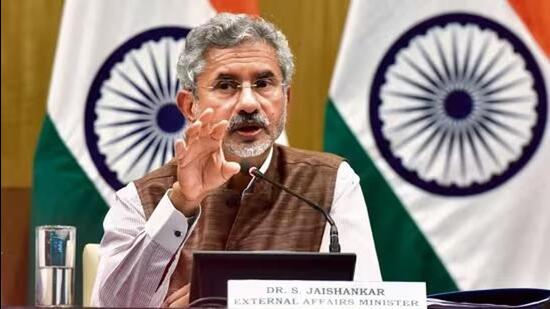External affairs minister S Jaishankar said India is one of the most open, pluralistic and understanding nations of the world
External affairs minister S Jaishankar on Saturday countered US President Joe Biden’s description of India as “xenophobic” by saying the country is one of the most open, pluralistic and understanding nations of the world.
Addressing an Asian-American audience at a campaign fundraiser on Wednesday, Biden had sought to link the economic issues of India and Japan to a “xenophobic” outlook that included not welcoming immigrants. He had also caused surprise by grouping India and Japan – both key partners of the US – with Russia and China.
When Jaishankar was asked about Biden’s remarks at an interaction in the Odisha capital of Bhubaneswar, he replied by characterising India as the “most open society” in the world.
“Till today, I have never seen such an open, pluralistic, diverse society. So, I would say that we are actually not just not xenophobic, we are the most open, most pluralistic and in many ways, the most understanding society in the world,” he said speaking in a mix of English and Hindi.
“Secondly, there was some talk about economic performance. You know our GDP (gross domestic product) is at 7%. You check other people’s GDP, check their growth rate and you will get the answer,” he added.
Biden had said that the next US presidential election in November was about “freedom, America and democracy” and that the US welcomes immigrants. He added: “Think about it. Why is China stalling so badly economically? Why is Japan having trouble. Why is Russia? Why is India? Because they’re xenophobic. They don’t want immigrants.”
Jaishankar also addressed questions about the Israel-Hamas war, tackling terrorism emanating from Pakistan and India’s strained relations with China because of a nearly four-year military stand-off on the Line of Actual Control (LAC).
Referring to West Asia, he said nearly nine million Indian citizens live in the region, which has currently been affected by war and tensions. “It is our effort to look after them, to help them if anything happens to them,” he said.
“In the diplomatic arena, when tensions increased and two sides attacked each other, on the instructions of Prime Minister [Narendra] Modi, I phoned the foreign ministers of the two countries and gave them the message that the world doesn’t want you to take this any further, and that they should reduce the tensions in a responsible manner. And this is what happened after that,” he said, referring to his phone conversations with his counterparts from Iran and Israel shortly after Tehran launched hundreds of drones and missiles in retaliation for an Israeli airstrike on an Iranian diplomatic compound in Syria.
“We have taken an initiative for our people who work in shipping. Now, 21 ships of the Indian Navy have been deployed in the region and their job is to maintain peace and patrol the area to prevent attacks on merchant shipping,” he added.
Jaishankar noted that leaders of countries in West Asia value Modi so much that they gave preferential treatment to Indian citizens during the Covid-19 pandemic.
The Modi government, he said, will make no compromises in terms of countering cross-border terrorism from Pakistan or the Chinese military build-up along LAC.
“When it comes to national security, the Modi government will never make a compromise. It can be cross-border terrorism from Pakistan, it can be pressure on the border from China, it can be terrorism we had in the past from [the] Myanmar border, [and] before we did the Land Boundary Agreement, even from Bangladesh. But we are very clear. For us – Bharat first, security first. There is no compromise,” he said.
Pakistan has a history of fostering cross-border terrorism and India had been “tolerating it” till the Modi government came to power. “We were turning the other cheek. We were not acting. After Modiji came, things have changed. You saw Uri [and] Balakot. So, we have made it very, very clear today that any threat of…cross-border terrorism which comes from Pakistan will get the appropriate response from India,” he said.
Jaishankar said China had attempted to put pressure on India by “bringing a lot of troops to the Line of Actual Control” in the past four years. “We have very strongly countered it. Today…thousands of troops of the Indian Army are on deployment in the LAC alongside China. We are very clear – we are there, we are strong, we are deployed. Any action we have to take as per circumstances, our armed forces will naturally be the best judge of it,” he said.
He was also asked about Nepal issuing new bank notes that depicted Kalapani, Limpiyadhura and Lipulekh, regions that are part of India, as Nepalese territory. Jaishankar responded by saying India’s position on this matter is very clear.
“With Nepal, we were having discussions about our boundary matters through an established platform. And then in the middle of that, they unilaterally took some measures on their side. But by doing something on their side, they are not going to change the situation between us or the reality on the ground,” he said.
Get Current Updates on India News, Elections 2024, Election 2024 Date along with Latest News and Top Headlines from India and around the world.
This post was originally published on 3rd party site mentioned in the title this site








